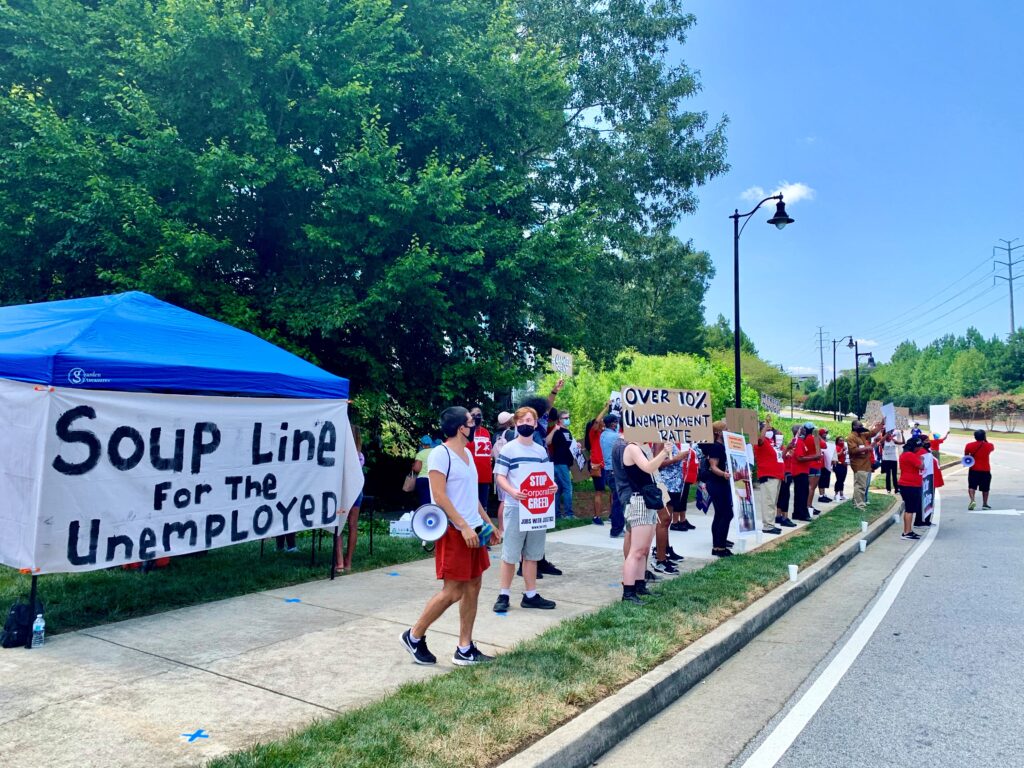
Dozens of airport, restaurant and hotel workers protested outside the Atlanta office of U.S. Sen. Kelly Loeffler, R-Ga., Tuesday over stalled talks in Congress on a new federal aid package amid the COVID-19 pandemic.
Talks over a second round of federal coronavirus aid hit a roadblock last week as Democratic lawmakers in the U.S. House and Republican lawmakers in the U.S. Senate failed to strike an agreement over how much funding to send state and local governments and whether to reup the $600 weekly unemployment benefit.
That prompted President Donald Trump to issue executive orders on Saturday calling on states to issue eligible recipients $400 weekly unemployment checks starting this month, of which $100 would have to be covered by state funds.
The president also ordered federal housing officials to identify funding for homeowner and rental assistance, and for U.S. Treasury officials to defer payments on certain payroll taxes through the end of the year.
Loeffler, who is running a tight race to hold her Senate seat in the Nov. 3 general election, praised the president’s actions last Friday as talks in Congress fell short. She has supported passing new federal coronavirus aid funds that focus on boosting financial support for jobs, schools and health-care facilities, on top of divvying out unspent dollars from an earlier round of assistance passed in March.
Loeffler also brought legislation in June that would set the federal unemployment benefit at an amount equal to what workers were making while previously employed.
“Here in Georgia, we have thousands of jobs to be filled,” Loeffler said in a Fox News interview last Friday. “And sadly, millions have lost their jobs, but we need to make sure that we aren’t providing incentives for people to stay home.”
Union-represented workers in Atlanta protesting the lack of action on Congress’ part disputed that characterization Tuesday, arguing jobs in many industries like hotels and retail are still scarce and that the $600 weekly benefit has been essential to keep laid-off workers afloat.
Felicia Fashina, 55, said she has tried returning to her job at Hartsfield-Jackson Atlanta International Airport but that her employer has not brought back nearly as many workers as before the pandemic, forcing “skeleton crews” of shorthanded staff to juggle multiple tasks.
Now, her school loans and medical costs she covers for her elderly mother are piling up, even as she remains unable to afford a $500 monthly COBRA insurance payment offered by her employer to out-of-work staff.
“No one’s asking to get rich,” Fashina said. “We just want to survive, that’s all.”
Rodney Watts, 54, has also been unable to pay for COBRA insurance after being sent home from his 10-year job as an airport overnight supervisor in March amid the pandemic. While it would help, he is skeptical the reduced $400 weekly benefit will actually take effect.
“Is it going to go through?” Watts said. “There’s a lot of red tape behind it.”
Many critics of Trump’s executive order have questioned whether states like Georgia will be able to cover the 25% costs of the $400 weekly benefit, noting state governments are already facing huge budget cuts spurred by the economic slowdown.
New weekly unemployment claims in Georgia slowed earlier this month as initial claims filed in total since March 21 reached nearly 3.4 million, more than the state Department of Labor has handled during the last eight years combined.
The ongoing response to COVID-19 looks to be a major issue in the race for Loeffler’s Senate seat, to which she was appointed late last year following the decision by former U.S. Sen. Johnny Isakson, R-Ga., to retire due to health concerns.
Her main Republican opponent in the free-for-all special election, U.S. Rep. Doug Collins, R-Gainesville, has supported lowering the virus-prompted federal unemployment benefit or doing away with it entirely. The leading Democratic candidate in the race, Rev. Raphael Warnock, has called for the $600 weekly amount to remain in place.
Loeffler has also focused much of her campaign on policing issues and touting support for law enforcement agencies amid nationwide protests since June against police brutality and racial injustice.
In recent weeks, Loeffler has brought a legislative package in the Senate aimed at increasing penalties for criminal gang members, property destruction during protests and local governments that do not prosecute violent protesters and rioters.
Nearly two dozen candidates including Loeffler have qualified for the Nov. 3 special election to fill the remaining two years of the Senate term formerly held by Isakson. Candidates from all parties will be on the same ballot, and a runoff will be held in January if no candidate wins more than 50% of votes in November.
This story has been updated to include information on legislation Sen. Loeffler filed in June regarding unemployment benefits.
